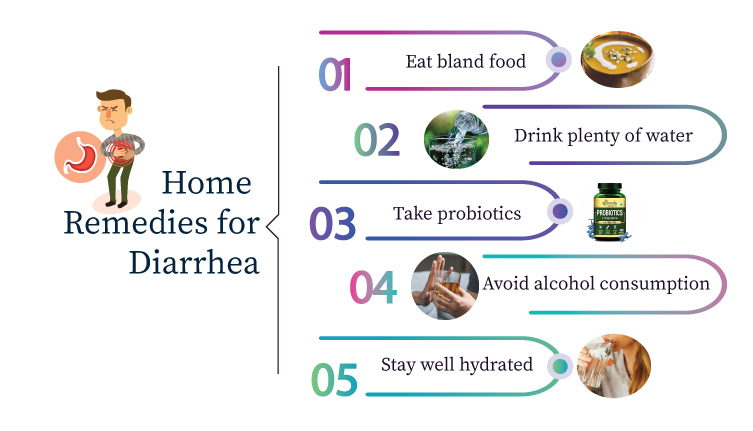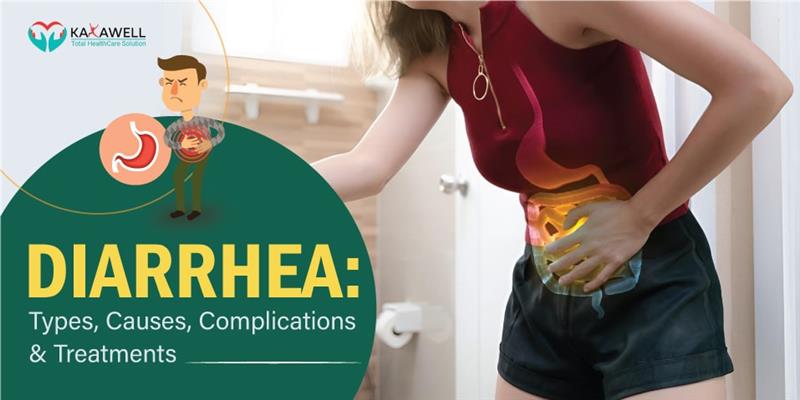Diarrhoea refers to loose, watery stools occurring more than three times a day. It is a common condition that typically lasts a few days and resolves on its own. However, it can sometimes indicate a more serious underlying issue. This blog will cover the types, symptoms, treatments, and home remedies for Diarrhea.
Types of Diarrhea
There are five major types of diarrhoea: watery, bloody, mucous, pus-filled, and severe.
- Watery diarrhoea often occurs after eating contaminated foods or beverages and is characterized by frequent loose motion with clear liquid.
- Bloody diarrhoea results from bleeding along the digestive tract and can occur after consuming spoiled meat or vegetables.
- Mucous diarrhoea is caused by inflammation of the lining of the intestines, resulting in a thick, sticky stool.
- Pus-filled diarrhoea develops when bacteria invade the intestinal wall and cause abscesses.
- Severe diarrhoea may accompany dehydration, fever, vomiting, stomach pain, headache, or confusion.
If you have watery diarrhoea for more than two days, a fever, or blood in your stool, you should see a doctor. Additionally, focusing on the prevention of diarrhoea through proper hygiene and safe food practices is essential for maintaining health.
What Causes Diarrhea?
There are many causes of diarrhoea, including:
- Food poisoning
- Viral or bacterial gastroenteritis
- Infection of the digestive tract
- Inflammation of the intestinal lining
- Intestinal obstruction
- Severe dehydration
- A reaction to medication
- Lactose intolerance
Causes of Diarrhea in Children
Children develop diarrhea due to poor nutrition, dehydration, and lack of proper care. Children with diarrhea should drink plenty of fluids to replace lost body fluids. In addition, they should eat bland, soft foods and avoid foods that make them feel nauseated.
Causes of Diarrhea in Adults
Diarrhea is not uncommon among adults, especially those stressed by work or travel. Adults can also get diarrhea if they consume alcohol or use recreational drugs. Stressful situations increase the risk of developing diarrhea, particularly in women. Alcohol consumption increases the risk of diarrhoea by interfering with the normal functioning of the gastrointestinal system. Recreational drugs can affect the way the brain processes information about the need to eliminate waste.
The Symptoms of Diarrhea
You might experience some of the following symptoms of diarrhoea:
– Vomiting
– Abdominal cramps
– Nausea
– Fever
– Loss of appetite
1. Vomiting
Vomiting is a symptom of diarrhea. You may feel nauseous, vomit, or both when you have diarrhea. If you experience vomiting, drink plenty of water. Avoid alcohol and caffeine. Try taking some ginger tea if you’re feeling sick.
2. Abdominal Cramps
Abdominal cramps are painful contractions in your abdomen. Cramping can occur at any time, especially during a bout of diarrhea. You might feel them after eating, drinking, or having sex. In severe cases, they can cause pain that radiates to your back and legs.
3. Fever
A fever occurs when your body temperature rises above 100.4 degrees Fahrenheit (38.0 degrees Celsius). Most people who get diarrhea are also likely to have a high fever. If you do, take your temperature. Call your doctor immediately if it’s over 101 degrees F.
4. Nausea
Nausea is the feeling of sickness. Many people who have diarrhea also feel nauseated. It’s caused by the same thing that causes vomiting, stomach acid. Drink lots of water to stay hydrated. Ginger tea helps settle your stomach.
 5. Loss of Appetite
There could be many reasons you are experiencing a loss of appetite during diarrhea. One possibility is that you are not taking in enough fluids and are becoming dehydrated. This can lead to a loss of appetite. Another possibility is that the diarrhea is causing you discomfort and pain, which makes it difficult to eat.
The Treatments for Diarrhea
Treatment depends on the cause of diarrhea.
- If a bacterial infection causes diarrhea, antibiotics are prescribed. Antibiotics help prevent the spread of disease and reduce the severity of the illness.
- When a viral infection causes diarrhea, rest and fluids are recommended.
- To treat pregnancy-related diarrhea, a doctor may recommend taking extra fluids and adding fiber to the diet.
- People with diarrhea caused by alcohol or drug abuse should seek medical attention.
Home Remedies for Diarrhea
If you are experiencing diarrhea, there are several home remedies that you can try to help relieve your symptoms. Below we have listed the five most effective ones.

1. Drink Plenty of Water
Drink lots of water, preferably 8-10 glasses per day. Water helps keep the body functioning correctly and prevents dehydration. Diarrhea causes inflammation in the digestive tract and can lead to stomach cramps. If you feel bloated after drinking water, try eating fiber-rich foods like fruits and vegetables.
2. Eat Bland Food
Avoid spicy, greasy, fried, or acidic foods. These foods can cause gas and bloat. Instead, eat foods that are mild, soft, and high in protein. Try eating bananas, apples, yogurt, rice, bread, beans, lentils, chicken breast, fish, and eggs.
3. Take Probiotics
Probiotics are live bacteria that help maintain a healthy balance of gut flora. Probiotic supplements can provide relief if taken regularly. You may want to take probiotic capsules along with your meals, primarily if diarrhea is caused by antibiotic use.
4. Avoid Alcohol Consumption
Alcohol can dehydrate the body and worsen diarrhea symptoms. Alcohol can also increase intestinal permeability, making your intestines leaky and allowing bacteria to enter your bloodstream.
5. Stay Well Hydrated
Hydrating fluids like juice, sodas, and sports drinks can help prevent dehydration. Keep a bottle of water handy at home and work, and drink small amounts frequently throughout the day.
If your diarrhoea does not improve after trying these home remedies, or if you have a fever, bloody stools, or severe abdominal pain, you should consult your doctor.
Are Diarrhea, Constipation, and Dehydration the Same?
No, they are not!
Diarrhoea is when the body produces abnormally high amounts of liquid faeces. This may occur due to an infection (cholera), food poisoning, or intestinal inflammation.
When water loss exceeds the amount of fluid intake, the person becomes dehydrated. Dehydration causes the body to lose its average balance between fluids and electrolytes. Fluid and electrolyte imbalances may cause diarrhoea.
Constipation is the opposite of diarrhoea. It is when the stool does not pass out of the rectum easily. A constipated bowel movement is hard, dry, and difficult to pass. Sometimes, the stools become sticky and foul-smelling.
When to See a Doctor for Diarrhea?
There are many reasons why people might experience diarrhoea, and not all of them require medical attention. However, there are some instances when it is essential to see a doctor for diarrhoea.
If the diarrhoea is accompanied by a fever, blood in the stool, or severe pain, it is likely that a person has a more serious condition and needs medical attention.
Additionally, if diarrhoea lasts more than a few days or is accompanied by dehydration, it is also essential to seek medical help.
What is Constant Diarrhea a Sign Of?
There are many potential causes of constant diarrhoea, including infections, food allergies or intolerances, and autoimmune disorders. If you have chronic diarrhoea, you should see a doctor to find the cause and receive treatment.
What is Watery Diarrhea a Sign Of?
Watery diarrhoea is a sign of a gastrointestinal infection, such as gastroenteritis, which is caused by a virus, bacteria, or parasite. It is usually not serious, but it can lead to dehydration if it is not treated.
Final Words
Diarrhoea can range from mild to severe. If left untreated, diarrhoea can cause dehydration, electrolyte imbalances, and even death.
When taking care of yourself or some other person with diarrhoea, keep them well-hydrated and make sure they get plenty of rest. A person should drink at least 1/2 gallon of water per day.
In addition to keeping a person hydrated, avoid foods that may worsen their condition. These include caffeine, alcohol, fatty foods, spicy foods, citrus fruits, and dairy products. Diarrhoea treatment is manageable with proper care and nutrition.
If possible, try to keep the person calm and relaxed. Keep them warm, dry, and out of direct sunlight. Try not to force liquids down their throat if vomiting occurs.

Leave a Reply
You must be logged in to post a comment.